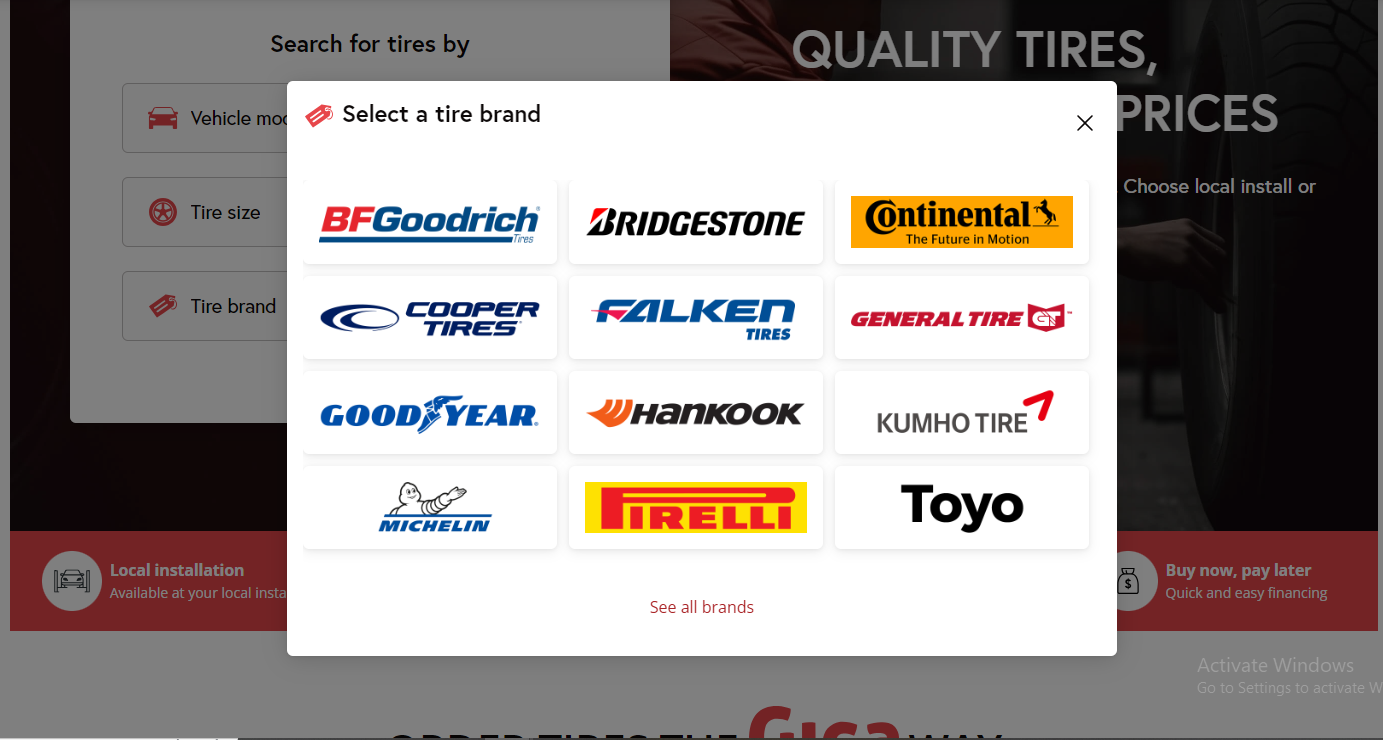Last Updated on 2 months
Introduction to the Variety of Best Tire Brands Choices
The tire industry, a critical segment of the global automotive market, has witnessed significant growth and diversification over the past few decades. This growth is fueled by technological advancements, evolving consumer needs, and the continuous pursuit of safety and efficiency in vehicular mobility. Today, tires are not just about mobility; they embody a blend of engineering precision, environmental considerations, and consumer preferences, choosing the right tire as important as the vehicle itself.

Overview of the Best Tire Industry
The tire industry is a pivotal component of the global automotive sector, marked by continuous innovation and diverse consumer demands. This industry encompasses various brands, each catering to specific vehicle types and driving conditions. In this overview, we’ll delve into the historical evolution, current market dynamics, and the technological advancements that shape today’s tire industry, offering a glimpse into its complex and ever-evolving nature.
Historical Perspective
The tire industry’s journey began with the simple rubber tire and has evolved into a complex market with many options. Charles Goodyear’s invention of vulcanized rubber in the 19th century was pivotal, paving the way for John Boyd Dunlop’s first pneumatic tires in the 1880s. Since then, the industry has grown exponentially, adapting to the needs of an ever-evolving automotive sector.
Global Market Dynamics
The tire industry is a global powerhouse, marked by established players like Michelin, Bridgestone, and Goodyear and emerging brands from various parts of the world. According to market research, the global tire market is expected to grow, driven by increasing vehicle production and demand for replacement tires.
Technological Innovations
Innovation remains at the heart of tire manufacturing. The industry constantly evolves, from introducing radial tires in the 1940s to developing eco-friendly and intelligent tires. Today’s tires are a product of extensive research and development, offering improved safety, longevity, and fuel efficiency.
Consumer Trends and Preferences
Consumer preferences play a significant role in shaping the tire market. Factors like vehicle type, driving conditions, climate, and budget influence tire choice. The rise in SUVs and electric vehicles has led to the development of specialized tires. At the same time, the demand for sustainable solutions has spurred the creation of eco-friendly and energy-efficient tires.
Regulatory and Environmental Factors
Regulatory standards and environmental considerations also influence the tire industry—regulations about tire safety, performance, and environmental impact guide manufacturers in tire production. Additionally, the push for sustainability has led to innovations in tire recycling and the use of renewable materials.
The Competitive Landscape
The tire industry’s competitive landscape is marked by intense competition and strategic collaborations. Companies compete on various fronts, including price, quality, brand reputation, and technological advancements. This competition has resulted in diverse best tire brands offering unique features and benefits.
The variety of tire brand choices available today is a testament to the dynamic and innovative nature of the tire industry. From humble beginnings to a technologically advanced market, the tire industry continues to evolve, offering consumers a broad spectrum of options to meet their specific driving needs. As part of Giga Tires’ commitment to helping consumers navigate this diverse market, understanding the industry’s history, market dynamics, and consumer trends is crucial in making informed tire choices.
History of Best Tire Manufacturing
The history of tire manufacturing is a rich tapestry of innovation and technological advancement. From the earliest rubber tires to today’s sophisticated designs, this journey highlights the evolution of an industry integral to global transportation.
The Evolution of Tires
The story of tire manufacturing is a fascinating journey of innovation and adaptation. It began in the mid-19th century with the advent of vulcanized rubber, patented by Charles Goodyear in 1844. This breakthrough made rubber more durable and suitable for industrial use, laying the foundation for the first pneumatic (air-filled) tires created by John Boyd Dunlop in 1888. Initially designed for bicycles, these tires significantly improved ride comfort and performance.
As automobiles emerged and gained popularity in the early 20th century, the demand for more durable and reliable tires grew. This period saw the development of the first tires with tread patterns, enhancing traction and handling. The 1920s marked the introduction of balloon tires, which were lower in pressure and more comprehensive, offering a smoother ride than their predecessors.
Key Innovations and Their Impact
Key tire manufacturing innovations have revolutionized driving and perceived vehicle safety and efficiency. These breakthroughs have profoundly impacted the automotive industry and consumer experiences, from radial tire design to eco-friendly materials.
Radial Tire Revolution
One of the most significant innovations in tire technology was Michelin’s development of radial tires in the 1940s. With their perpendicular steel belting, radial tires offered a longer lifespan, better fuel efficiency, and improved safety. This technology rapidly became the standard, fundamentally changing the tire manufacturing industry and setting new benchmarks for tire performance.
The advent of Synthetic Rubber
During World War II, the supply of natural rubber became critically limited, prompting the development and use of synthetic rubber. This innovation addressed the supply issue and led to tire longevity and performance improvements, as synthetic rubber could be tailored to specific requirements.
Tubeless Tires and Safety Features
The 1950s saw the introduction of tubeless tires, enhancing safety by reducing the risk of sudden blowouts. Over the years, manufacturers have continued to innovate in tire safety, introducing features like steel belting, radial ply tires, and advanced tread designs to maximize grip and minimize wear.
Environmental and Efficiency Concerns
In recent decades, the focus on environmental sustainability has prompted manufacturers to develop eco-friendly tires made from renewable materials. The rise of electric vehicles has also led to the creation of tires that minimize rolling resistance, extending battery life and enhancing vehicle efficiency.
Smart Tire Technologies
The advent of innovative technology has introduced a new era in tire manufacturing. Today’s intelligent tires have sensors that monitor pressure, temperature, and tread wear, providing real-time data to enhance safety and performance. These innovations represent the tire industry’s commitment to adapting to the digital age.
The history of tire manufacturing is characterized by constant innovation and adaptation to changing technologies and consumer needs. From the simple rubber rings of the 19th century to today’s high-tech intelligent tires, each key innovation has left a lasting impact, shaping how we drive and perceive vehicle safety and efficiency. As part of Giga Tires’ commitment to offering the best in tire technology, understanding this rich history helps consumers appreciate the advanced engineering behind every tire they purchase.
The Diversity of Best Tire Brands
The tire industry, a crucial segment of the global automotive sector, is characterized by a remarkable diversity of brands. This diversity reflects the varied needs of drivers worldwide, encompassing different vehicle types, driving conditions, and performance requirements. In this article, we explore the major global tire manufacturers and emerging players in the market, offering insights into the dynamic landscape of the tire industry.
Major Global Tire Manufacturers
Major global tire manufacturers represent the pinnacle of tire technology and market influence. Companies like Bridgestone, Michelin, and Goodyear have shaped the industry through their commitment to quality, innovation, and global reach.
Bridgestone

Headquartered in Japan, Bridgestone is one of the largest tire manufacturers in the world. Founded in 1931, the company has established a reputation for quality and innovation, offering a wide range of tires for cars, trucks, buses, and specialized vehicles. Bridgestone is known for its commitment to research and development, which has led to tire durability and performance advancements.
Michelin

Michelin, based in France, is another global leader in tire manufacturing. Renowned for its radial tire technology, Michelin has been at the forefront of tire innovation since its inception in 1889. The company’s product lineup includes tires for passenger cars, heavy-duty trucks, and aircraft. Michelin is also notable for its environmental initiatives, including efforts to develop sustainable materials for tire production.
Goodyear

The Goodyear Tire & Rubber Company, founded in 1898 in the United States, is one of the most recognizable names in the tire industry. Goodyear offers an extensive range of tire products and is known for its pioneering work in tire technology, including developing all-season tires and advancements in tire tread life and fuel efficiency.
Continental

Germany’s Continental AG, established in 1871, has a rich history of tire manufacturing and automotive technology. The brand is synonymous with high-quality tires for passenger cars, trucks, and motorcycles and is a significant player in developing automotive safety technologies.
Pirelli

Pirelli, an Italian tire manufacturer founded in 1872, is renowned for its high-performance tires, often used in motorsports. Pirelli’s focus on performance, style, and innovation has made it a preferred choice for luxury and sports car manufacturers.
Emerging Players in the Market
Explore the rise of emerging tire manufacturers in the global market, such as Hankook, Apollo Tyres, Toyo Tires, and Cooper Tires. These companies are making significant strides with their commitment to quality, affordability, and innovation, adding diversity to the industry and providing consumers with more choices to meet their specific tire needs.
Hankook

South Korea’s Hankook Tire has rapidly emerged as a significant player in the global tire market. Known for its commitment to technology and quality, Hankook has gained recognition for its high-performance and ultra-high-performance tires.
Apollo Tyres

India’s Apollo Tyres, established in 1972, has grown significantly in the international market. The company produces affordable, quality vehicle tires catering to emerging and established markets.
Toyo Tires

Another Japanese tire manufacturer, Toyo Tire Corporation, has gained a strong foothold in the global market, particularly in the high-performance tire segment. Founded in 1945, Toyo is known for its innovative approach to tire design and material technology.
Cooper Tires

Cooper Tire & Rubber Company, based in the United States, has carved out a niche in the tire industry, focusing on replacement tires. Cooper is known for its wide range of affordable, reliable car, truck, and SUV tires.
Factors Influencing the Proliferation of Best Tire Brands
The tire industry has witnessed a remarkable proliferation of brands over the years, driven by various factors shaping market dynamics. Understanding these factors is crucial for consumers and industry players alike. This article delves into the primary elements contributing to the diversity of the best tire brands available today.
Technological Advancements
Technological advancements in the tire industry have been a driving force in shaping the landscape of tire manufacturing and design. These innovations, from developing new materials to integrating innovative technologies, enhance tire performance, safety, and sustainability.
Innovation in Materials and Design
The tire industry is a hotbed of innovation, with continuous advancements in materials and design. Developing new rubber compounds, integrating synthetic materials, and refining tire architectures like radial construction have significantly enhanced tire performance and durability.
Manufacturing Technologies
Advancements in manufacturing technologies have enabled tire companies to produce tires more efficiently and with greater precision. Automated systems and cutting-edge production techniques have allowed for the mass production of high-quality tires, promoting brands to cater to a broader market with diverse needs.
Smart Tire Technologies
The advent of intelligent tire technologies has opened new frontiers in the industry. Sensors embedded in tires can now monitor pressure, temperature, and tread wear, providing valuable data for safety and maintenance. This technological leap has led to new brands specializing in innovative tire solutions.
Market Demand and Consumer Behavior
Market demand and consumer behavior are critical in influencing the variety and features of tire products. This section explores how evolving consumer preferences, changing driving habits, and the increasing focus on vehicle-specific needs have impacted tire manufacturing trends and brand diversity.
Varied Consumer Needs
The tire market is shaped significantly by diverse consumer needs. Different driving habits, vehicle preferences, and performance expectations have led to a market that demands a wide range of tire types, from all-season tires to specialized performance tires.
Brand Perception and Loyalty
Consumer perception plays a critical role in the tire market. Brand reputation, historical reliability, and customer loyalty influence consumer choices, encouraging tire manufacturers to differentiate themselves through branding and marketing strategies.
The Role of Online Marketplaces
The rise of online shopping has transformed the tire buying experience. Consumers now have access to a broader range of brands and models, allowing smaller and newer brands to gain visibility and compete with established players.
Geographic and Climatic Considerations
Geographic and climatic considerations are pivotal in determining the design and functionality of tires. This part of the article delves into how different environmental conditions and regional requirements influence the development of specialized tire types, catering to a wide range of driving conditions and climates.
Regional Preferences
Tire preferences vary significantly across regions, influenced by local driving conditions, road infrastructure, and vehicle types. Brands often tailor their product lines to meet these regional preferences, contributing to the diversity of options available in the market.
Climate-Specific Tires
Climatic conditions play a crucial role in tire design and selection. Brands have developed specialized tires for weather conditions, such as winter tires with enhanced traction for snowy conditions and heat-resistant tires for warmer climates.
Globalization of Brands
Globalization has enabled best tire brands to expand their presence across different continents, adapting their offerings to suit the specific needs of each market. This global reach has increased brand visibility and contributed to various tire options available to consumers worldwide.
Understanding these factors can help consumers navigate this diverse landscape more informally. As part of Giga Tires’ commitment to offering a wide selection of tires, recognizing these influences helps us cater to our customers’ specific needs, ensuring they find the right tires for their vehicles and driving conditions.
Understanding Different Tire Types
Selecting the right tire is pivotal to ensuring a vehicle’s safety, efficiency, and performance. As part of Giga Tires’ mission to provide comprehensive tire knowledge, this article aims to elucidate the types of tires available that are tailored to various vehicles and specific driving conditions.
Tires for Different Vehicles
Choosing the right tires for different vehicles is crucial for optimizing performance, safety, and comfort. This section explores the tire types explicitly designed for passenger cars, SUVs, trucks, and other vehicle categories, highlighting how each is tailored to meet distinct vehicular demands and driving experiences.
Passenger Car Tires
These tires, including those for sedans, hatchbacks, and minivans, are designed for everyday use in passenger vehicles. They focus on providing a comfortable ride, good tread life, and fuel efficiency. Within this category are subtypes like all-season, performance, and touring tires, each offering a balance of traction, comfort, and durability.
SUV and Light Truck Tires
SUVs and light truck tires are built to accommodate heavier loads and provide more excellent durability. These tires often have reinforced sidewalls and aggressive tread patterns for better traction and stability, especially for off-road or rugged terrain driving.
Commercial and Heavy-Duty Truck Tires
Commercial and heavy-duty truck tires are designed for the rigors of commercial use and heavy loads. They feature robust construction to withstand long hours on the road and variable weights, with tread patterns optimized for long-haul efficiency and safety.
Specialty and High-Performance Tires
High-performance tires are crafted for sports cars and performance-oriented vehicles. They offer superior handling, higher speed capabilities, and a focus on traction during aggressive driving. These tires usually have a lower profile and stiffer sidewalls for better road feedback and cornering ability.
Specialized Tires for Specific Conditions
Specialized tires are engineered to excel in specific conditions and environments. From winter tires designed for icy roads to all-terrain tires for off-road adventures, this segment delves into the diverse range of specialized tires, each crafted to enhance safety and performance under particular driving conditions and climates.
Winter Tires
Winter tires are essential for driving in snow, ice, and cold temperatures. They are made with a softer rubber compound and unique tread designs to provide better grip and handling in winter conditions. The tread is designed to channel snow and slush and reduce the risk of ice skidding.
All-Terrain and Mud Tires
For vehicles that venture off the beaten path, all-terrain and mud tires are ideal. All-terrain tires balance on-road comfort and off-road capability, while mud tires are designed for extreme off-road conditions with deep, aggressive tread patterns.
Eco-Friendly Tires
Eco-friendly tires are designed to reduce environmental impact. They typically feature low rolling resistance to improve fuel efficiency and use sustainable materials that minimize the tire’s carbon footprint.
Run-Flat Tires
Run-flat tires are designed to keep a vehicle mobile despite a puncture or loss of air pressure. This type of tire allows drivers to continue to a safe location or service center without needing a spare tire.
The tire industry offers a diverse range of products to suit every type of vehicle and driving condition. Understanding the vehicle’s specific requirements and the conditions in which you drive is crucial in selecting the appropriate tire type. At Giga Tires, we offer an extensive range of options to meet these varied needs, ensuring that every driver can find the perfect match for their vehicle and driving style.
Quality and Performance Variations
In the diverse tire manufacturing world, understanding the nuances of quality and performance is critical to making informed purchasing decisions. This article delves into how different tire brands influence quality and the various performance metrics used to compare these brands.
How Brand Affects Tire Quality
The influence of a brand on tire quality cannot be understated. This section examines how different tire brands impact the quality of their products, exploring the role of brand reputation, research and development, and manufacturing processes in ensuring tire durability, safety, and performance.
Reputation and Research & Development
A tire brand’s reputation often reflects its commitment to research and development. Established brands like Michelin and Bridgestone invest heavily in R&D, producing innovative tire designs and materials that enhance quality. This ongoing research improves tire longevity, fuel efficiency, and safety features.
Quality Control Standards
Top tire manufacturers adhere to rigorous quality control standards. These standards ensure that each tire meets stringent performance and safety criteria before reaching the consumer. Higher-end brands often have more thorough testing processes, improving their products’ quality and reliability.
Specialty and Niche Brands
Some best tire brands specialize in particular types of tires, such as high-performance or off-road tires. While sometimes less well-known, these niche brands can offer superior quality in their specific area of expertise due to their focused approach to tire manufacturing.
Performance Metrics Across Brands
Performance metrics are crucial in differentiating tire brands and guiding consumer choices. This part of the article delves into the various performance metrics used to compare best tire brands, such as tread life, handling, fuel efficiency, and ride comfort, offering insights into how these metrics shape the value and appeal of different tire brands in the market.
Tread Life and Durability
Tread life is a critical metric for tire performance. Higher-end brands often offer extended tread life warranties, indicating more durable tire compounds and tread designs. A tire’s longevity is vital in assessing its overall quality and cost-effectiveness.
Handling and Grip
The ability of a tire to handle different driving conditions and provide adequate grip is paramount. Performance metrics such as wet and dry grip, braking distance, and operating stability vary significantly across brands and are vital for safety and driving experience.
Fuel Efficiency
Tire rolling resistance affects vehicle fuel efficiency. Many brands have developed tires with low rolling resistance, improving fuel economy. This performance metric is increasingly essential in the context of environmental sustainability and cost savings.
Comfort and Noise
Ride comfort and noise levels are also critical metrics. Some brands focus on designing tires that offer a smoother ride and reduced road noise, enhancing the overall driving experience.
Price vs. Performance
The balance between price and performance is a crucial consideration. While premium brands often offer higher quality and better performance, mid-range and budget brands can provide satisfactory quality and performance for everyday use. Understanding specific needs and driving conditions can help consumers choose the right balance.
Navigating Tire Purchase
Given the vast array of options, purchasing new tires can be daunting. Understanding this process is crucial for balancing performance, durability, and cost. This guide aims to help you assess your tire needs, compare brands and prices, and ultimately make an informed decision.
Assessing Your Tire Needs
Choosing the right tire involves a thorough assessment of specific needs. This introduction discusses the importance of understanding vehicle specifications, driving conditions, and personal driving habits to identify the vehicle’s most suitable tire type.
Understanding Vehicle Requirements
The first step in choosing the right tire is understanding the vehicle’s requirements. This includes knowing the recommended tire size, load index, and speed rating, usually found in the vehicle’s manual or on the tire information placard.
Evaluating Driving Conditions
Consider the driving conditions that the car frequently encounters. Is the vehicle driven primarily in urban areas, or does it require tires that can handle off-road situations? Are you going to regions with severe winters, necessitating winter tires? The driving environment will significantly influence the type of tire you need.
Personal Driving Style
The driving style also plays a role in selecting tires. Touring tires might be ideal if one prefers a quiet, comfortable ride. Conversely, performance tires could be better if you enjoy a more dynamic driving experience.
Comparing Brands and Prices
Comparing brands and prices is essential for an intelligent purchase in the diverse tire market. This section highlights how to navigate the plethora of tire options, considering factors like brand reputation, price points, and the value different tire manufacturers offer.
Researching Different Brands
Researching the options is essential with the numerous best tire brands in the market. Look into the reputation of brands, read customer reviews, and consider the range of tires they offer. Brands like Michelin, Bridgestone, and Goodyear are known for quality and reliability, while other brands might offer more budget-friendly options.
Price Comparison
Price is a significant factor in the decision-making process. Compare prices across different retailers, including online platforms. Remember that while premium tires might be more expensive upfront, they could offer better value in the long run due to longer tread life and better fuel efficiency.
Understanding Warranties and Services
Examine the warranties and services offered by different brands and retailers. A good contract can provide peace of mind, while additional services like tire installation, balancing, and rotation can be essential factors when deciding.
Making an Informed Decision
Making an informed tire purchase decision requires integrating various factors, including tire needs, brand research, and budget considerations. Here, we outline a structured approach to selecting the right tires, ensuring a balance between quality, performance, and cost.
Balancing Quality and Budget
Strike a balance between quality and budget. While it is essential not to compromise safety and performance, consider what can realistically be afforded. Remember that the most expensive option is sometimes best for the required needs.
Seeking Professional Advice
If you need more clarification, feel free to seek professional advice. Tire experts can provide valuable insights based on your specific requirements and help you navigate the technical aspects of tire selection.
Finalizing Your Purchase
You can purchase it once you have assessed your needs, compare your options, and consulted professionals if necessary. Ensure comfortability with the brand, price, and performance promises of the tires you choose.
The Future of Best Tire Brands
The tire industry, a dynamic and ever-evolving sector, is poised for exciting changes in the coming years. With technological advancements and shifts in consumer demands, best tire brands are innovating rapidly. This article explores the innovations on the horizon and predictions for market changes, providing insights into the future for the best tire brands.
Innovations on the Horizon
The tire industry is on the cusp of a technological revolution, with groundbreaking innovations poised to redefine tire performance and functionality. This section explores upcoming advancements in tire technology, including intelligent tire capabilities, sustainable materials, and airless tire designs, highlighting their potential impact on driving safety and efficiency.
Smart Tire Technology
One of the most significant upcoming innovations in tire technology is the rise of intelligent tires. These tires are equipped with sensors that provide real-time data on tire pressure, temperature, and tread wear. This technology not only enhances safety but also aids in maintaining optimal tire performance and longevity.
Eco-Friendly and Sustainable Tires
Sustainability is becoming a key focus in tire manufacturing. Future tires are expected to be more eco-friendly, with increased use of sustainable materials and manufacturing processes. Biodegradable materials reduce rolling resistance for better fuel efficiency, and tires designed for electric vehicles are areas of ongoing development.
Airless Tires
Airless or non-pneumatic tires are being developed to eliminate the risk of punctures and improve durability. These tires are particularly promising for commercial and off-road vehicles, offering the potential for reduced maintenance and longer life spans.
Advanced Performance Tires
As vehicles become more advanced, the demand for high-performance tires is expected to grow. These tires will likely offer enhanced grip, reduced noise, and improved wear characteristics, catering to the increasing performance standards of modern vehicles.
Predictions for Market Changes
The tire industry’s future landscape is expected to undergo significant transformations. This part discusses predictions for market changes, focusing on trends such as increased personalization, the rise of new market entrants, the integration of tires with advanced vehicle technologies, and the expansion of online tire retail and services.
Shift Towards Personalization
The tire market will likely see a shift towards more personalized tire options. Consumers will have the ability to choose tires that are specifically tailored to their driving habits, vehicle type, and environmental conditions.
Increased Competition with New Entrants
The tire industry will continue to see new entrants, particularly from regions with growing automotive markets. This increased competition is expected to drive innovation and potentially lead to more competitive pricing.
Integration with Vehicle Technology
Tires are expected to become integral to the vehicle’s connected ecosystem, interacting with other vehicle systems for enhanced safety and performance. Integrating autonomous vehicle technology is also a key area of future development.
Expansion of Online Retail and Services
Online tire retail and services will expand, offering consumers more convenience and choice. Digital platforms will play a more significant role in how consumers research, compare, and purchase tires.
The future of best tire brands is marked by technological innovation, sustainability, and a shift towards more personalized products and services. These developments promise to enhance safety, performance, and environmental sustainability, reshaping the tire industry in the years to come. At Giga Tires, we are excited to be part of this journey, continuously updating our offerings to include the latest advancements and trends in tire technology.
Conclusion & Recommendations
As we conclude our comprehensive guide on tires, it’s essential to reflect on the key takeaways and offer final thoughts to aid in choosing the right tire brand. This journey through the intricacies of the tire world is aimed at empowering you, the consumer, with knowledge and confidence in your tire purchase decisions.
Key Takeaways:
Throughout this guide, we have explored various aspects of tire selection and purchase. We delved into the history and evolution of tire manufacturing, highlighting how past innovations have shaped current tire technologies. We examined the diversity of best tire brands and the impact of branding strategies in the tire industry to understand the influence of brand reputation on quality and consumer perception. We also tackled the practical aspects of tire selection, discussing how to assess tire needs, compare brands and prices, and make an informed decision.
The technological advancements in tire manufacturing promise exciting developments, while the anticipated market changes indicate a dynamic future for the tire industry. These insights are crucial in understanding the rapidly evolving landscape of tire technology and market trends.
Final Thoughts on Choosing the Right Brand
Choosing the right tire brand involves balancing several factors, including quality, performance, budget, and personal driving needs. While renowned brands offer quality assurance and implementation, emerging brands may present cost-effective alternatives without significantly compromising quality. It’s essential to weigh the pros and cons of different brands, considering your specific requirements and the conditions in which you drive.
When selecting tires, consider the longevity, safety features, and performance under various driving conditions. Remember, the cheapest option may only sometimes be the best in the long run. Tires are vital to your vehicle’s safety and performance, so investing in a reliable brand is investing in your safety and driving pleasure.
Find Your Perfect Tire at Giga Tires.
Having navigated the complexities of tire types, brands, and technologies, you are now equipped with the knowledge to make a well-informed tire purchase. At Giga Tires, we understand the importance of finding the perfect match for your vehicle and driving conditions. Our extensive collection features a wide range of options from top manufacturers to emerging brands, ensuring quality and reliability.
Whether you are looking for high-performance tires, eco-friendly options, or tires suited for specific climatic conditions, Giga Tires has it all. Our user-friendly website simplifies your tire buying process, providing detailed information and easy comparison tools to help you find the right tire at the right price.
We invite you to explore our selection and take advantage of our expertise in tire retailing. With Giga Tires, you’re not just purchasing a tire; you’re gaining a partner dedicated to providing the best tire for your needs. Click here to begin your journey towards the perfect tire purchase with Giga Tires – where quality meets reliability and affordability.
FAQs
What is the introduction of the tire?
The tire is a crucial vehicle component designed to provide traction, support the vehicle load, absorb shocks, and maintain direction. It is typically made of rubber reinforced with steel and fabric and tailored to various vehicle types and driving conditions.
What are the best tire brands?
Best tire brands refer to companies that manufacture or market tires. These brands vary in their focus on quality, performance, and price range and include well-known names like Michelin, Bridgestone, and Goodyear, as well as emerging and budget-friendly brands.
What are the different types of tires?
There are several types of tires, including all-season, summer, winter, performance, and off-road tires. Each class has specific tread patterns and rubber compounds to suit different driving conditions and vehicle requirements.
What are the other brand tires?
Numerous other best tire brands are in the market besides the well-known brands. These include mid-range and budget brands like Hankook, Cooper, and Yokohama, offering various options to cater to different preferences and budgets.
Which best tire brand is best?
The “best” tire brand varies based on individual needs and preferences. Premium brands like Michelin and Bridgestone are known for their high quality and performance, while other brands may offer more affordable options with satisfactory performance.
What are Tier 3 tire brands?
Tier 3 best tire brands are generally considered budget-friendly or lesser-known brands. They provide cost-effective options and are suitable for drivers with less demanding driving conditions and lower usage requirements.
Can I use two different tire brands?
Generally, using two different-brand tires on a vehicle is not recommended, as this can lead to uneven wear, handling issues, and potentially compromised safety. It’s best to use four tires of the same brand and type for optimal performance and safety.














 Français
Français Español
Español